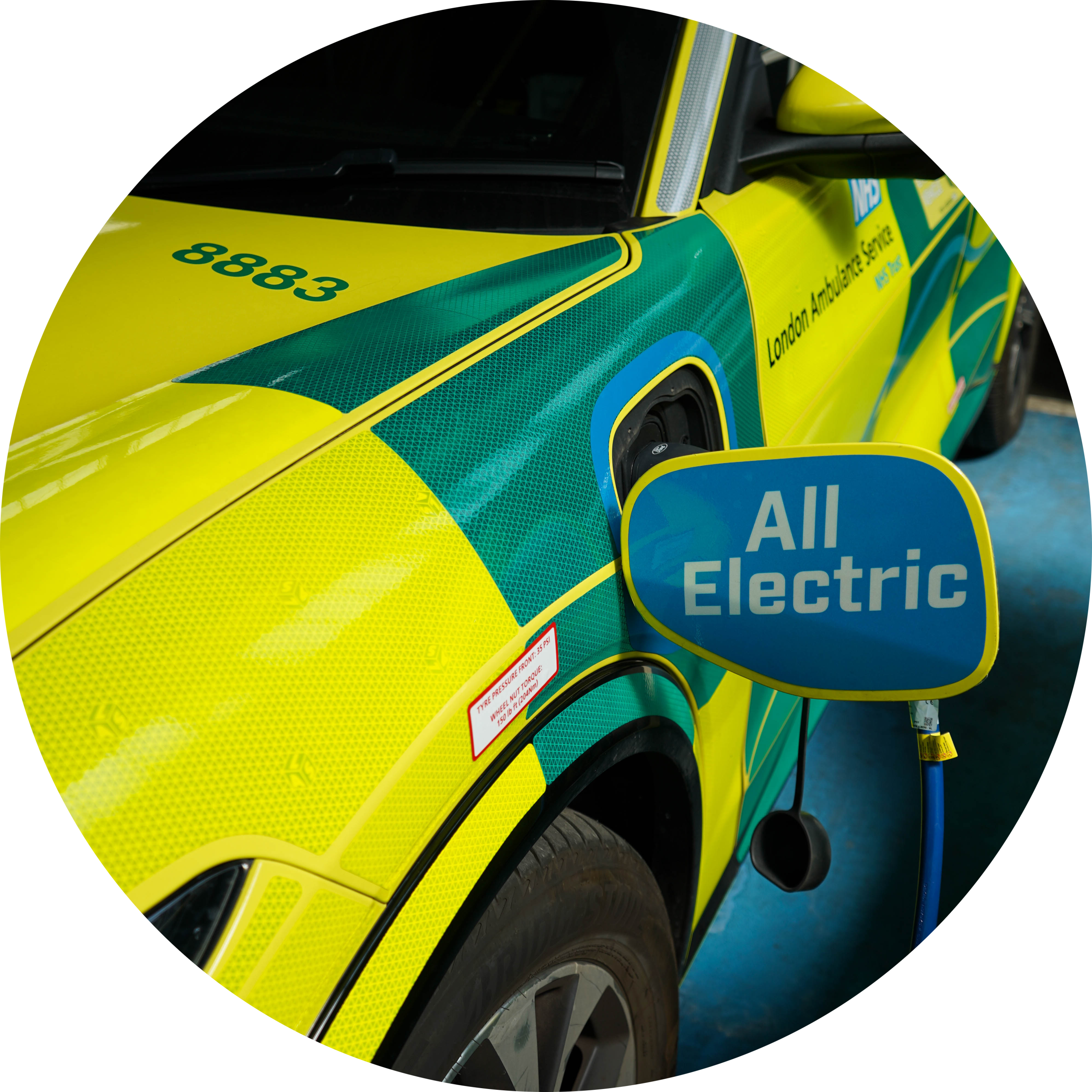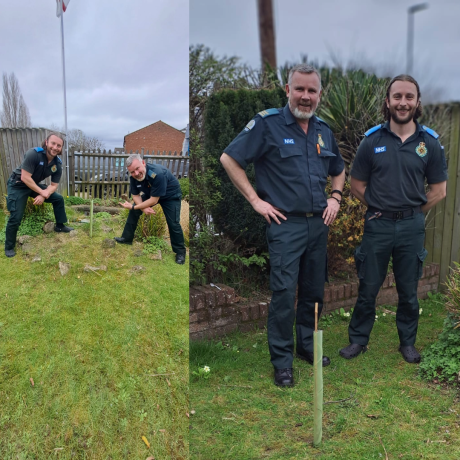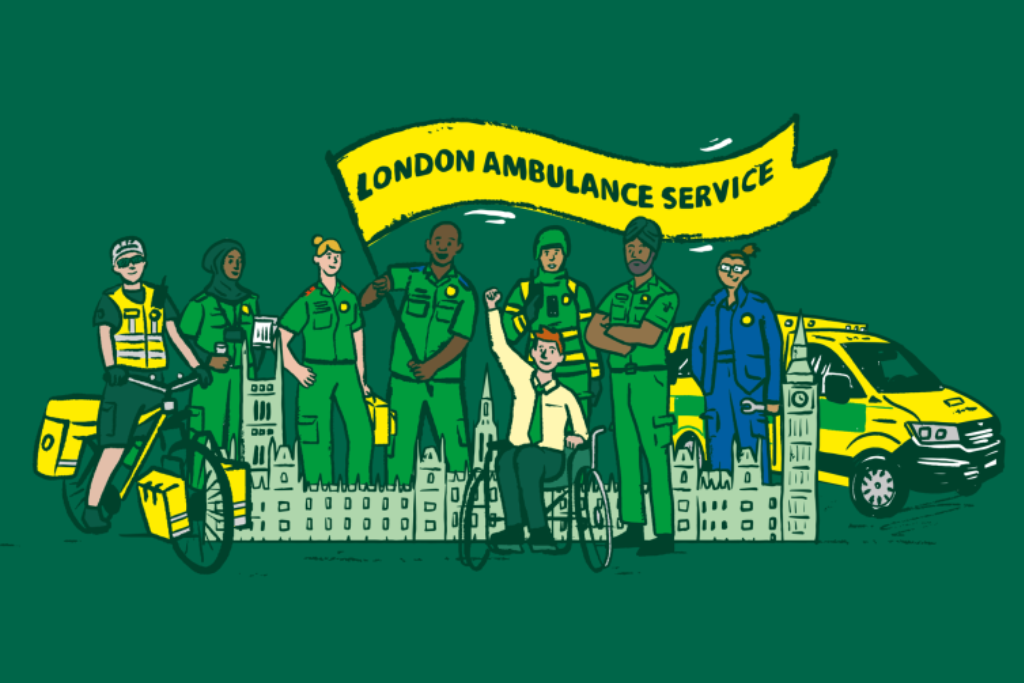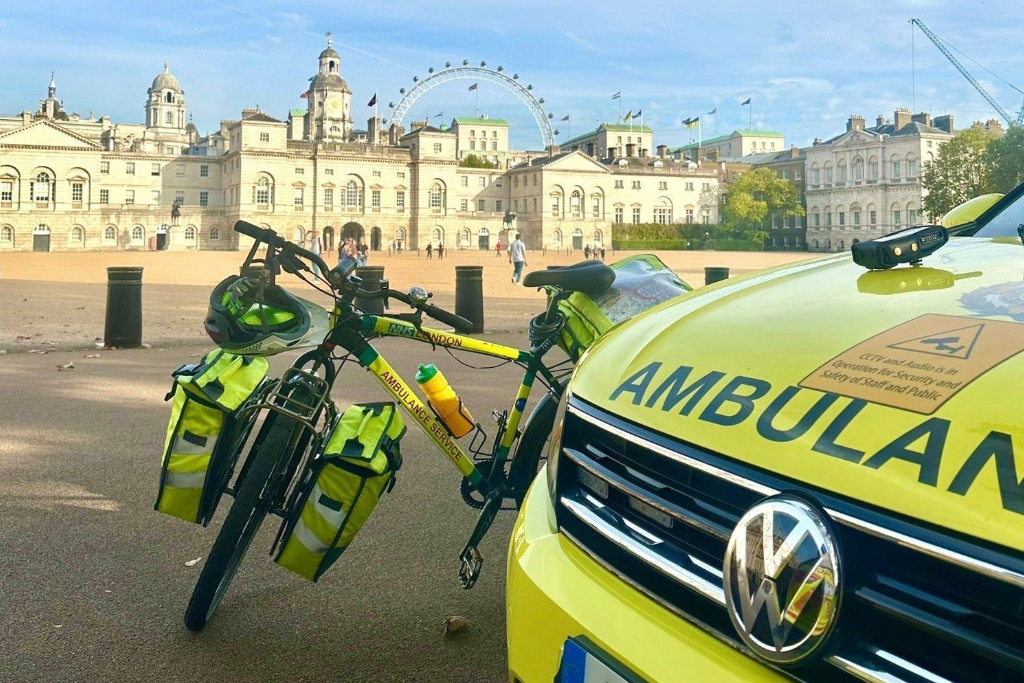London Ambulance Service Green Plan April 2025 – March 2029
With the conclusion of our first Green Plan (April 22-March 25), and in recognition of the ongoing public health emergency posed by global warming and climate change, we remain firmly committed to reducing our environmental impact. To build on our progress and continue working towards our long-term sustainability targets, we have developed a new four-year Green Plan.
Our long-term commitment to a greener NHS
Our first Green Plan from 2022-2025 was successfully delivered and achieved 8% carbon emissions reductions in the first two years.
We are also anticipating at least another 4% decrease in carbon emissions in the third and final year of the current plan although full carbon footprint calculations will not be available until September this year. We are targeting at least an annual 5% reduction in carbon emissions from 2025-2029.
In this new plan, we remain aligned with the NHS objectives to reach net zero:
- For direct emissions by 2040, with an interim target of an 80% reduction between 2028-32
- For indirect emission by 2045, with an interim target of an 80% reduction between 2036-38

Our key areas of work
We have updated our new Green Plan in line with the latest NHS guidance. We will continue to build on the successes of our first Green Plan while also addressing newly identified areas for action. Our approach will balance immediate emissions reductions in some areas with the strategic development of capabilities in others.
Our new Green Plan will be structured around the following key areas of work:
-
1 - Workforce and leadership
We will support our staff and leaders to learn, innovate and embed sustainability into everyday actions.
We will focus on the following areas:
- Senior leadership. The trust board has signed off this Green Plan and our Chief Financial Officer will continue being the designated senior-board net zero lead and will oversee the green plan delivery.
- Supporting behavioural change with a focus on training. We will provide sustainability training to form the foundation of engagement across our workforce.
We will look to introduce an apprenticeship sustainability role to support this programme.
- Enabling sustainability through our corporate operations. We will review all our corporate processes and identify digital solutions as an enabler to making greener and more sustainable choices.
- Supporting staff to make greener commuting choices. We will assess the commuting patterns of all staff through a bi-annual staff travel survey and support staff with making greener commuting choices where possible through interventions and infrastructure adaptations.

-
2 - Net Zero Clinical Transformation
We will support our staff and leaders to learn, innovate and embed sustainability into our clinical activities.
We will focus on the following areas:
- Senior clinical leadership. We will identify a board level clinical lead who will oversee the net zero clinical transformation.
- Reducing journeys to deliver care, where clinically appropriate. In line with the Trust Business Plan 2025/26 and 5 year strategy, we will increase hear and treat interventions.
- Reducing the environmental impact of our clinical operations. We will continue to review our environmental impact by reviewing opportunities for using alternative and more sustainable equipment and consumables.
- Ensuring our people are equipped to respond to the challenges of a changing climate. We will explore opportunities to research and review patient outcomes from diseases impacted by climate change and adapt our clinical response in line with these.
- Reducing volumes of clinical waste. We will actively review our clinical waste volume and ensure correct segregation of waste
-
3 - Digital Transformation
We will prioritise sustainability in the procurement, design and management of digital services.
We will focus on the following areas:
- We will maximise the benefits of digital transformation to reduce emissions and improve patient experience. We will invest in technology with the aim of reducing the use of paper and by providing virtual pathways where clinically appropriate.
- Supported by the Digital Maturity Assessment, we will consider opportunities to embed sustainability in IT digital services. We will use circular and low-carbon approaches to IT hardware management, including longer device lifetimes, leasing models, buying refurbished or remanufactured equipment and PC power down.
-
4 - Medicines
We will build on progress in reducing anaesthetics gases, while improving patient care and reducing waste. We will work to reduce emissions from the medicines supply chain.
We will focus on the following areas:
- We will work to reduce the environmental impact of anaesthetic gases. We will work to reduce nitrous oxide wastage. We will explore opportunities to develop a product to capture nitrous oxide.
- We will work to reduce the volumes of clinical waste. We will review ordering and licenses to sell excess or unused packs of vaccines
- We will look for digital alternatives to reduce paper usage. We will work to improve accuracy, governance, compliance and efficiency.
-
5 - Travel and transport
We will follow the NHS Net Zero Travel & Transport Roadmap to decarbonise our travel and transport.
We will focus on the following areas:
- We will finalise ULEZ compliance by on-boarding and decommissioning the remaining of the fleet to reach 100% ULEZ compliance by Q3 2025.
- We will comply with NHS targets by only offering electric vehicles through the salary sacrifice scheme from 2026 and by only procuring or leasing net zero emissions vehicles (excluding ambulances) from 2027.
- We will prepare for zero emissions zone by 2029 (just central London) by ring fencing electric vehicles to central London and enabling the needed EV infrastructure to support this.
- We will continue transitioning to and sustaining a zero emissions fleet by procuring electric vehicles wherever possible.
-
6 - Estates
We will take care of our estate to reduce emissions and lower costs, while improving energy resilience and patient care. Estates contributes to 7% of our carbon footprint, which includes energy, waster and waste but it also plays a role in providing the EV infrastructure to allow electrifying our fleet.
-
Buildings:
We will focus on the following areas
- New buildings:
- Achieving BREEAM* excellent
- Installing EV infrastructure 50kWh and 100kWh subject to vehicle type and site capacity
- Installing Building Management Systems (BMS) in new developments
- Refurbished buildings:
- Achieving BREEAM* good
- Minimum of 50 kWh EV chargers
- Installing Building Management Systems (BMS)
- The remaining estate: We will look to improve our EPC rating in the remaining of the estate to meet the target of a rating of B by 2030 with an interim target of EPC C by 2028.
- Solar panels: We will look to install solar panels in 10 sites per year, an enabler to improve EPC ratings.
- EV charging infrastructure: We will explore battery storage solutions in line with the installation of solar panels in all new sites. Rolling out EV infrastructure in line with our electric fleet rollout
-
EV charging infrastructure:
We will continue increasing our EV infrastructure as an enabler of the electrification of fleet.
We will focus on the following areas:
- Reviewing capacity. We will review our capacity on all sites over a 7-days period to understand our load demand usage
- Upgrading Capacity. We will upgrade our existing EV infrastructure to accommodate more chargers and with higher charging capacity
- Utilising mobile EV chargers. We will assess and upgrade to enable the 32 or 64 Amp commando sockets
- Fast Chargers. We will install fast chargers at sites already identified with sufficient capacity
- We will seek opportunities to collaborate with external key partners.
- We will explore and apply for external grant funding opportunities.
-
Facilities
Although most of our waste is converted into energy, we aim to reduce our volumes and reduce, reuse or recycle our waste as much as possible
We will focus on the following areas:
- Improving waste segregation:
- We will roll out an offensive waste project to reduce clinical waste
- We will continue improving recycling infrastructure to allow waste segregation
- We will engage staff members about waste management and waste segregation
- We will use data to implement changes and achieve KPIs aligned with NHS Clinical Waste strategy
- Circular economy:
- We will introduce a system to reuse office and other equipment within the trust
- We will identify opportunities for circular economy
- Reduce waste costings: We will achieve a 15% cost reduction in clinical waste
-
-
7- Procurement
Based on the current approach to calculate carbon emissions, procurement represents about 50% of our carbon footprint. So far, we have been following the NHS Net Zero Supplier Roadmap and will continue to do so.
We will focus on the following areas:
- Embedding social value. We will prioritise sustainability within our contracts including social value.
- Capturing carbon emission from the supply chain. We will capture sustainability data to understand carbon emissions from procurement in a more accurate approach and will encourage suppliers to report carbon emissions.
-
8 - Climate adaption
We will look into building resilience and adaptation into business continuity and longer-term planning to avoid climate-related service disruptions.
We will focus on the following areas:
- We will identify climate change related risks and elaborate a climate change adaptation plan aligned with TCFD.
- Preparedness and adaptation.
- We will comply with the adaptations provision within the NHS Core Standards for emergency preparedness, resilience and response and the NHS Standard contract to support business continuity during adverse weather events.
- We will create a system to alert of weather events and ensure adequate cascading of weather health alerts and relevant messaging across the organisation, in line with the government’s adverse weather and Health Plan.
- We will set out actions to prepare for severe weather and improve climate resilience of local sites and services, including digital services.
- External collaboration. We will work in partnership with other healthcare providers on climate-change related risks.
Related content
Our strategy

Our vision for delivering outstanding emergency and urgent care whenever and wherever needed for everyone in London.
Getting involved

Everyone has a part to play in helping #TeamLAS save lives in London. Find out how you can get involved.
Latest news

Read our latest announcements on sustainability to find out how we our delivering on our net zero commitment .

Follow us on social media: